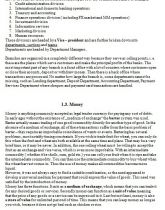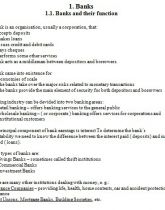Seminárna práca: Banking - seminárna práca z predmetu Anglický jazyk
Skryť detaily | Obľúbený- Kvalita:87,3 %
- Typ:Seminárna práca
- Univerzita:Ekonomická univerzita v Bratislave
- Fakulta:Fakulta hospodárskej informatiky
- Kategória:Jazyky
- Podkategória:Angličtina
- Predmet:Anglický jazyk
- Ročník:1. ročník
- Rozsah A4:10 strán
- Zobrazené:2 139 x
- Stiahnuté:17 x
- Veľkosť:0,1 MB
- Formát a prípona:MS Office Word (.doc)
- Jazyk:anglický
- ID projektu:8312
- Posledna úprava:15.02.2018
1. Banks
1.1. Banks and their function
A bank is an organisation, usually a corporation, that:
- accepts deposits
- makes loans
- issues credit and debit cards
- pays cheques
- performs some other services
A bank acts as a middleman between depositors and borrowers.
A bank came into existence for
1. economies of scale
2. the banks take over the major risks related to monetary transactions
3. the banks provide the main element of security for both depositors and borrowers
Banking industry can be devided into two banking areas:
1. retail banking - offers banking services to the general public
2. wholesale banking - ( or corporate ) banking offers services for corporations and institutional customers
The principal component of bank earnings is interest To determine the bank´s
profitability we need to know the difference between the interest paid ( deposits) and interest earned ( loans).
Main types of banks are:
1. Svings Banks - sometimes called thrift institutions
2. Commercial Banks
3. Investment Banks
There are many other institutions dealing with money, e. g.:
Insurance Companies - providing life, health, home contents, car and accident protection insurance
Credit Unions, Mortgage Banks, Building Societies, etc.
1.1. Banks and their function
A bank is an organisation, usually a corporation, that:
- accepts deposits
- makes loans
- issues credit and debit cards
- pays cheques
- performs some other services
A bank acts as a middleman between depositors and borrowers.
A bank came into existence for
1. economies of scale
2. the banks take over the major risks related to monetary transactions
3. the banks provide the main element of security for both depositors and borrowers
Banking industry can be devided into two banking areas:
1. retail banking - offers banking services to the general public
2. wholesale banking - ( or corporate ) banking offers services for corporations and institutional customers
The principal component of bank earnings is interest To determine the bank´s
profitability we need to know the difference between the interest paid ( deposits) and interest earned ( loans).
Main types of banks are:
1. Svings Banks - sometimes called thrift institutions
2. Commercial Banks
3. Investment Banks
There are many other institutions dealing with money, e. g.:
Insurance Companies - providing life, health, home contents, car and accident protection insurance
Credit Unions, Mortgage Banks, Building Societies, etc.



